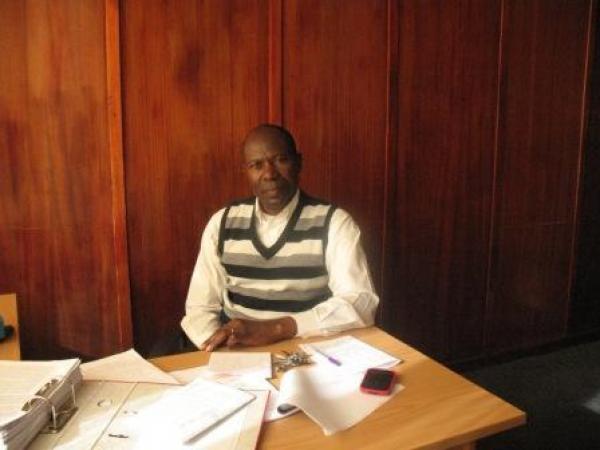Former car guard gets his master’s degree

Former car guard Albert Mpazayabo’s great regret is that he cannot use his new master’s degree in his own country, Rwanda.
Mpazayabo, 52, graduated with a master’s degree in HIV and AIDS management in April 2014. But, he says, his degree is “meaningless” because he cannot use it.
Twenty years after the genocide in Rwanda, he is still a refugee. He fled his country during the genocide and sought refuge in the Democratic Republic of Congo (DRC). In 1995, the refugee camps in DRC were destroyed and he fled to South Africa with his wife and son Christian, who was three years old.
“I miss my country. If the political situation in my country changes, no one will remind me to go back. Receiving a master’s degree from Stellenbosch University is meaningless because I am not utilising it. My skills are needed here and in my country, but I cannot use them because I am a refugee. In the past I applied for many psychologist positions but I was turned down because they do not hire refugees for senior positions. I would have to have a work permit, permanent residence or a South African ID to qualify.”
“Life as a refugee is difficult. I could not get a professional job even with my University of Western Cape (UWC) Bachelor of Psychology. Back home I worked for the Rwandan Red Cross as a senior Health Training Officer.”
Mpazayabo’s parents were killed in the genocide but his brothers and sisters all survived the war and are doing subsistence farming in Rwanda. They haven’t seen each other for 20 years. They rarely speak on the phone because of the cost.
“When I came here safety, survival, settling and trying to come to terms with what had happened in my life were my priorities. At that time I never had thoughts about furthering my studies. “
He got his first job, in October 1997, as a security guard, then found work in Kenilworth as a car guard. He used to earn at least R20 a day. Earnings were variable: on Mondays, there were no tips, on Fridays it was better, month end was good and on holidays like Christmas the customers’ mood changed and the tips were generous
“In 1999 I was transferred to Pinelands then Brackenfell. In 2008 the business owner offered me a contract to run the parking attendants’ business.”
Mpazayabo graduated from UWC with a BA in psychology in 2009 and completed his Master’s at Stellenbosch this year, with a scholarship from the university. Now he is studying for a Post Graduate Diploma in Monitoring and Evaluation.
His plan is to become a researcher and establish a community research centre to utilise his skills.
“I feel good and proud of myself. In spite of all the struggles I managed to receive a master’s degree.”
The most trying time was in 2007,when his first wife, Florence, died. He managed to find some work as a lay counsellor at Brackenfell Clinic, but the salary was low and he was overworked. He left the job and went back to his parking attendant job.
In 2009 he married again, to Benyse, who is also from Rwanda and is a dressmaker.
Christian is now 21 and studying for a Bachelor of Anthropology at the University of Cape Town (UCT). Fifteen-year-old Sandrine is at school in Parow and the younger children are Rebekkah, four, and Samuel, one. Mpazayabo says the children are integrating well but they speak only Afrikaans and English and cannot speak their father’s language.
Next: Khayelitsha Inquiry final report delayed
Previous: Activists call for fair employment conditions for community health workers

This article is licensed under a Creative Commons Attribution-NoDerivatives 4.0 International License.


